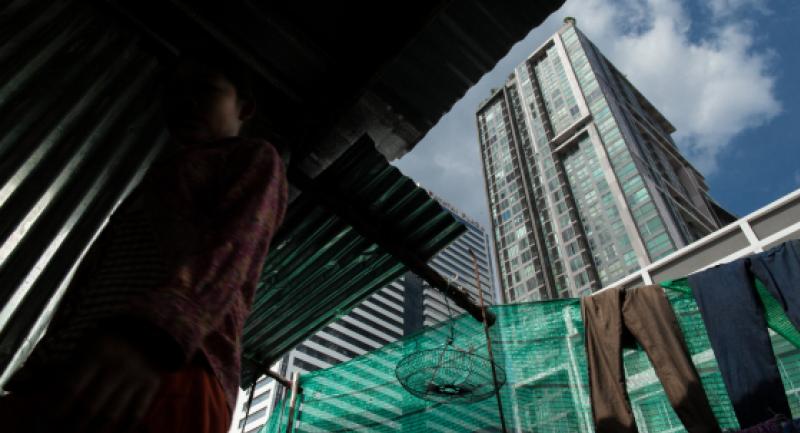Life inside a tin-sheet camp in our shining City of Angels

An encounter with a migrant child labourer opens the door to a parallel world beneath the gleaming skyscrapers of downtown Bangkok
Fourteen-year-old Naree is woken every morning at 6am sharp by the thud of footsteps next door. Her daily “alarm clock” tells her it’s time to wash and get ready for another hot day under the Bangkok sun.
Long black curls brushing her shoulders, she reaches for a floral pink sarong and then for a yellow safety helmet, and heads out to the communal bathing area. She greets her friends with a cheery laugh, then splashes water on her polished dark skin, shy and wary among the group of young muscular guys dressed only in loincloths who share the area.
This strange showering scene is just part of everyday life for the Cambodian migrants who live beneath skyscrapers at the tin-sheet workers’ camp in Phaya Thai district.
The corrugated metal huts are cheap and easily relocated by the contractors, who are based nearby to cut transportation expenses.
Despite the astronomical price of land downtown, the Thai construction industry is still growing, which means shiny clusters of the temporary communities continue to mushroom all over the city.
Most of the workers who live in the camps are from Cambodia, Myanmar or Laos, intermingled with a contingent from the Northeast of Thailand. The migrants having crossed the border on long journeys in search of a better life.
The living conditions at the Phya Thai camp are difficult, with residents forced to share an open-air showering area that’s full of floating garbage and also houses an unsanitary toilet. A path of broken plywood planks leads over the mud to tiny one-room shacks. Most of the children here spend all day long in camp, barred from attending school because their parents lack registration documents.
In their four-metre-square box of wood and tin, Naree, her mother and little brother roll up a dusty mattress to make space for cooking. The family chat cheerfully as they slurp bor bor, Cambodian rice porridge with sliced cabbage, to fortify themselves for the morning ahead.
After breakfast and clad in the pyjama outfit she will wear all day, Naree takes hold of her mother’s hand and heads up to the 7th floor construction area.
While she works high up in the stalk of a new skyscraper, her little brother Tull spends the day below having fun with his friends. The bathing area has become a huge pond and the game is to jump from one plank to another without falling into the pit of “crocodiles” – plastic bottles. Occasionally they take a break to search the dustbins for more bottles that they can redeem for a few baht at the end of the month.
Naree is one of about 60,000 children living in the construction camps, according to the Baan Dek Foundation, a child-protection charity. Many of them have little or no access to basic healthcare or education.
When asked about their living conditions, most complain about the tiny rooms.
Surprisingly, Naree smiles widely when asked if she is happy.
“I can stay here because of my mum. There is nothing to do back home except work in a rice field, which doesn’t provide enough money. Conditions got too arid for farming so my mum decided to bring me and my little brother to Bangkok.”
The family plans to return home to Cambodia one day, but Naree’s mother admits that if they run out of money again, they might have to move back to one of Bangkok’s tin villages.
Naree arrived in the capital just three months’ ago and feels a long way from home.
“I can stay here happily because … I have my mum and my siblings here, which is no different from my homeland. There is only a tiny room for sleeping, resting and eating, which is quite different. I have no treasures [but] just being with my mum is enough,” she says.
Economic hardship meant she had to leave her homeland with little more than mat and pillow, but the family is still together and that means everything for this young girl.
The precarious situation of families like Naree’s is made worse by the crisis of land-grabbing that is afflicting her country and has also reared its head in Thailand. Many have been evicted from just such tiny shacks as the one she and her family now occupy.
Refugees amid the twin crises of economic downturn and land-grabs, her family has found at least some kind of haven in the City of Angels. Given her current living conditions, though, Naree is unlikely to view modern Bangkok as a heaven.
